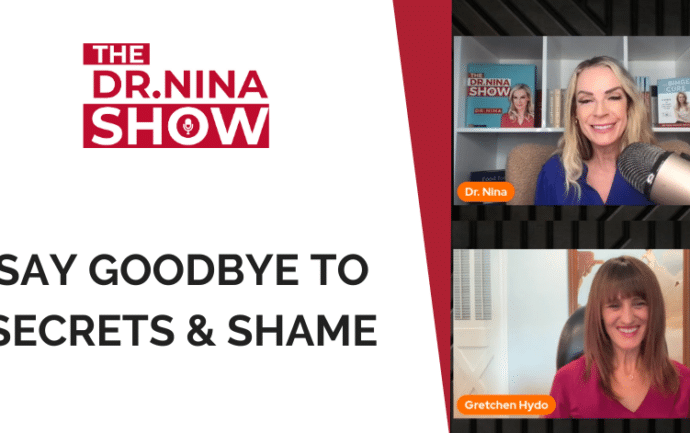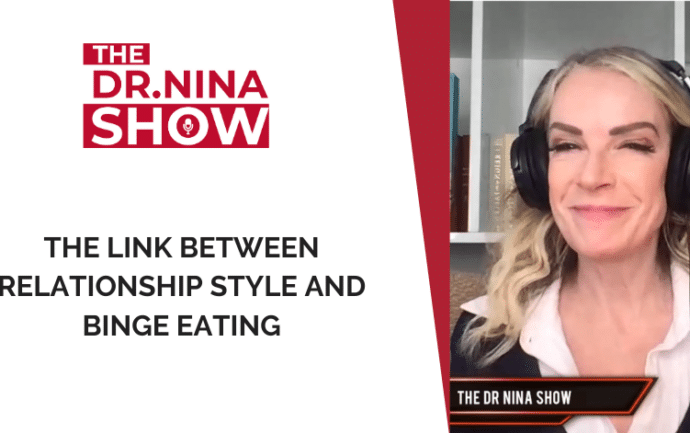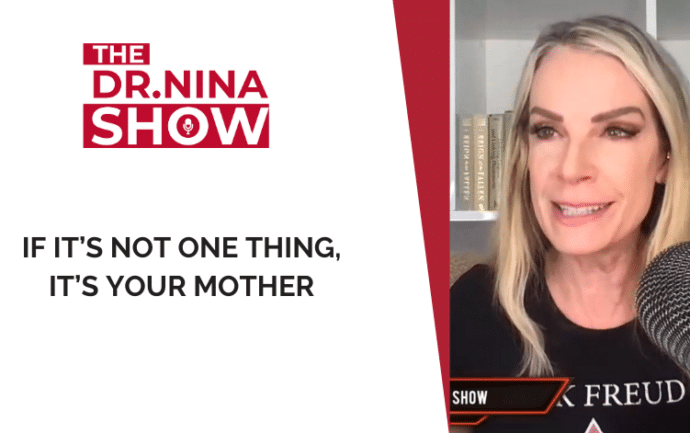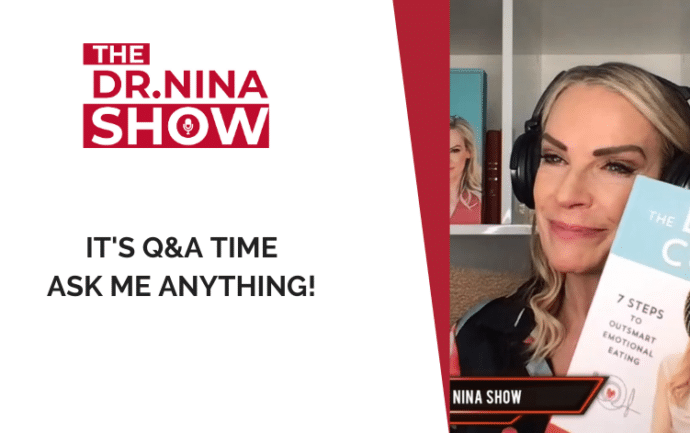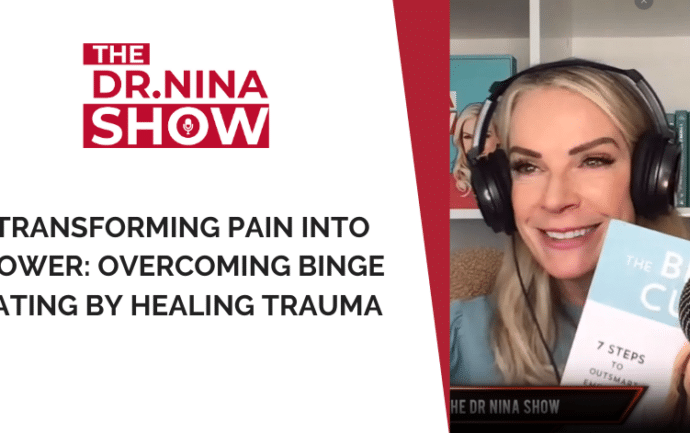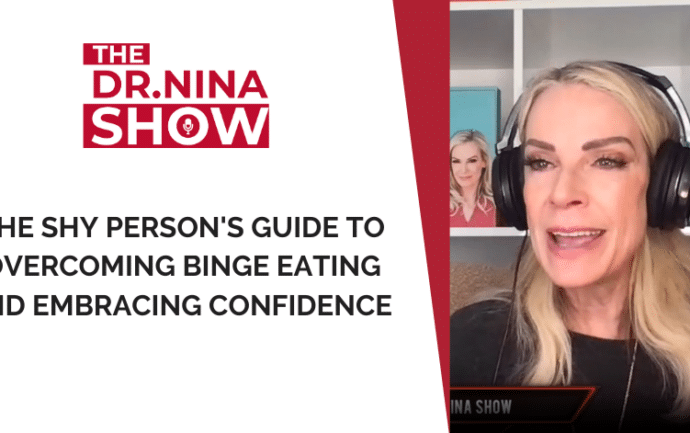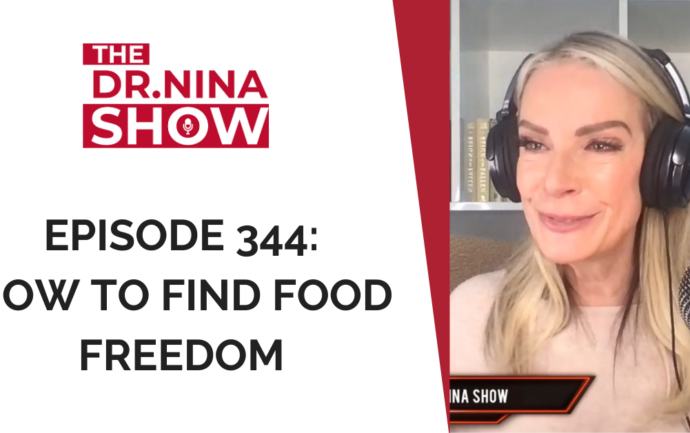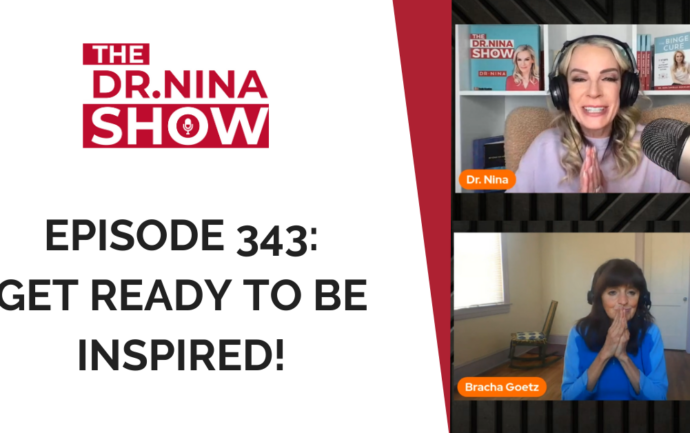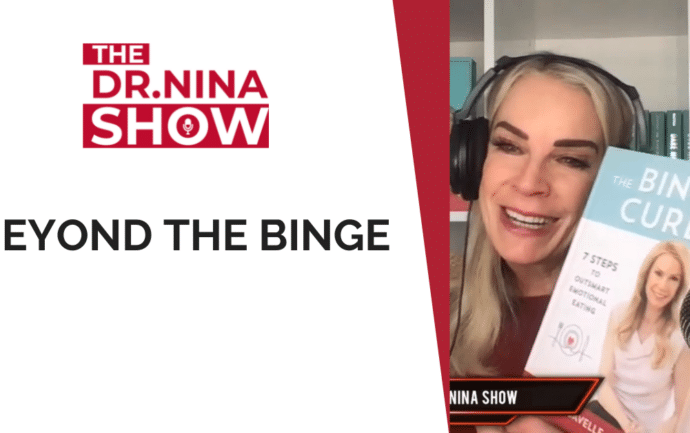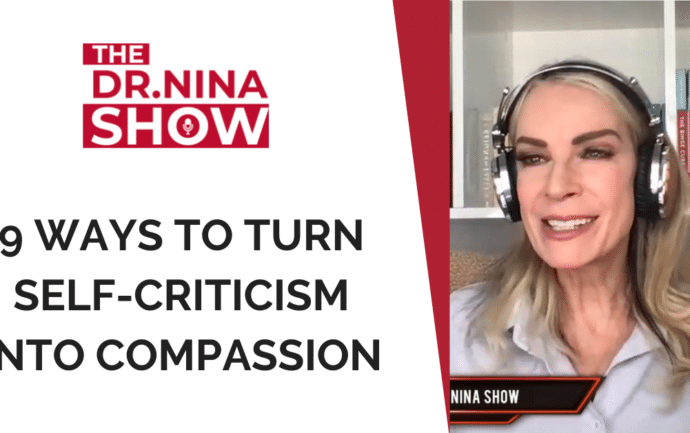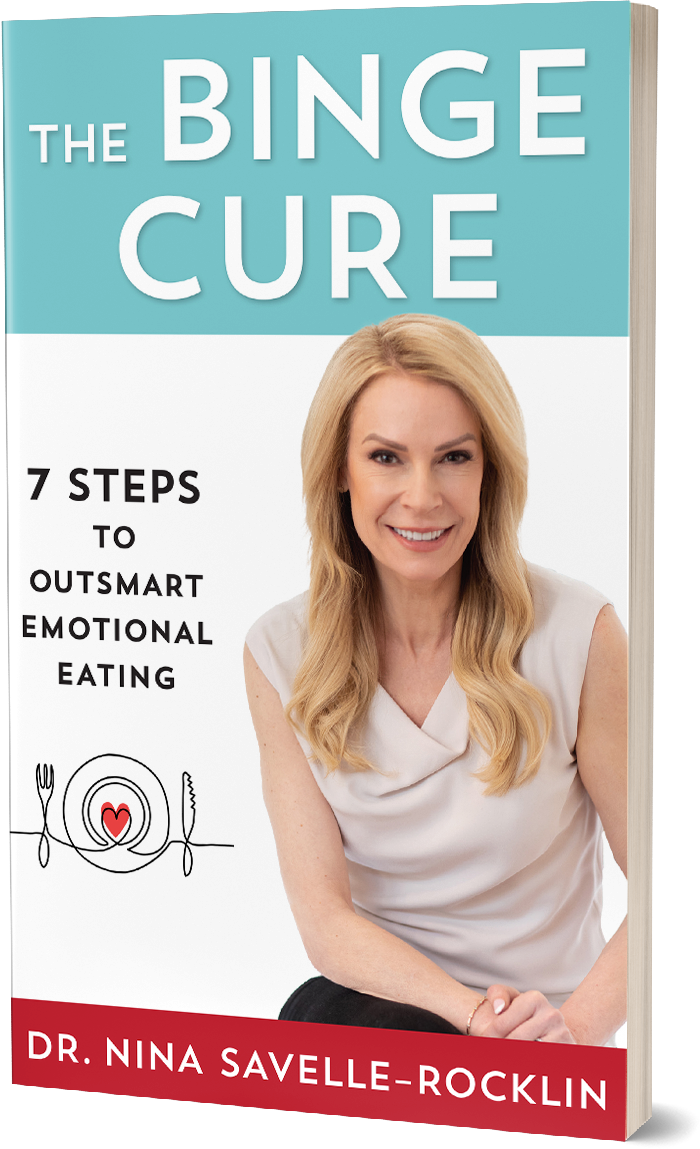Dr. Nina Savelle-Rocklin
Fearlessly Authentic with Jodi Harrison Bauer
Summary
Today I had the pleasure of talking with Jodi Harrison Bauer (@jodiharrisonbauer), who’s living proof that age cannot define you.
Jodi is the oldest woman ever to be a finalist for the Iconic Sports Illustrated swim issue. As a two-time world bikini champion, owner of JodiFit fitness studio, and host of the Fearlessly Authentic podcast.
She knows it’s never too late to get healthy, find love, change careers, or have the life you want.
We talked about taking risks, not yourself by a number, whether it’s age or the number on the scale, and how to stay motivated, plus much more!
Transcript
Unknown Speaker
You're listening to the Dr. Nina show with Dr. Nina Seville Rocklin only on LA Talk Radio.
Dr. Nina: Hi there. Welcome to the Dr. Nina show with Dr. Nina Savelle-Rocklin. That is me. I am your host. And I am here to help you stop counting calories, carbs, and fat grams, so you can easily get to a healthy weight and get on with your life. Today I have a special treat for you all. I have a guest. I haven't had a guest, and I think, over a year, but I am super excited to introduce you to her to you. Because one of the things that I hear a lot from people is, Oh, it's, it's too late. It's too late for me to lose weight. It's too late for me to get in shape. It's too late for me to get a boyfriend and girlfriend to find love. It's too late for me to have the life that I always wanted. It's too late. And my guest today is living proof that it's not too late. It is never too late. And you are going to love her story.
So let me tell you a little bit about her. Jodi Harrison Bauer is a two-time world bikini champion, founder, and owner of Jodi Fit Boutique Fitness Studio. Host of Fearlessly Authentic Podcast and the oldest woman to ever compete for the iconic Sports Illustrated swim issue making global headlines and the top 60 finalists in 2019. And did I mention, and when you see her, you will be like, what did I mention, that Jody is 60 years old. She has not followed the rules or fit into the box that society wants to put her in wants to put us in.
She started competing in fitness shows when she was, quote on quote, too old. She opened a business at 50. She got married eight years later. She competed against women more than half her age for a spot in the Sports Illustrated swim to prove that age and beauty are not directly correlated. And today, she defines herself as an ageless warrior who lets nothing hold her back. She's an advocate against ageism. In her studio on her podcast and across her social channels, Jodi focuses on empowering women to gain confidence as they age because she knows it is never too late to start something new. And she is living proof of that. So let's meet her now. Welcome, Jodi,
Jodi: Thank you so much. I'm thrilled to be here.
Dr. Nina: I am so happy that you are here. And you know, I love your motto. Don't let age define you. Again, I know you guys on Instagram can't see her. But, you know, whatever we have in our minds when we think 60, which of course is just a made-up thing. You are proof that that is just that it's just a number and that really the vitality with which you live your life and the intention with which you live your life is what it's all about.
Jodi: It's very true. You know, I never led. I never thought about my age as being something that was going to stop me from doing anything until I did start getting older. And I was in my mid-50s, and I started realizing, oh, I'm aging, and people are regarding me as a mid-50-year-old, and I don't know if it was menopause. I don't really think it was because I don't really feel like menopause hit me hard like it does with a lot of women because always been active. I've always eaten healthy. I've always led a healthy lifestyle.
And but as I hit 60 this past December, I realized that I have accomplished a lot and didn't let age stop me. It was, you know what. It was really, when I did Sports Illustrated that I realized, wow, I'm a lot different than a lot of women my age because the feedback and the attention I got you know, making global news resonated with a lot of women all over the world and people were interested to find out what was my secret? What did I do? Why did I do this? You know, being on Good Morning America. They were their biggest question was, has age ever stopped you from doing anything? I said, you know, I'd never thought about my age until that happened.
Dr. Nina: Until other people made it an issue.
Jodi: Yes, exactly. Exactly. And I was just going about my business, just living my life just, you know, slaying dragons and just not thinking anything about it. I just thought, Get out of my way. I've got more stuff to do, you know, I have a lot of things I want to accomplish.
Dr. Nina: So slaying dragons, Get out of my way. You have this attitude of, Hey, I can do this. Have you always had that attitude? Is that something that has been with you? Or is it something that perhaps you learned?
Jodi: It was not something I was not that way at all. I was always a people pleaser. And I was afraid to upset anybody. So I always needed to check with people to make sure it's okay. Is this okay? Is this okay? I am, like the opposite end of the spectrum of spontaneous. And I do get into that even now, sometimes the paralysis analysis, but if I look back at my life before I got divorced to 42, I was always looking to please everybody and to be the peacemaker.
And I finally decided, and I didn't take a lot of risks, you know when it came to a lot of things, but when I look back, I think, oh, wow, I did, I did step out of my comfort zone a little bit, but not that much. But it wasn't until I got divorced where I really took the biggest risk of my life when I look back at it and realize, wow, you know, I walked away after 17 years of marriage, two children, the whole thing, you know what I'm talking about the house, the cars, the vacations, the dogs, the friends, the country clubs, all of that baloney that everybody thought was so important, the dream, right?
And I'm like, No, I don't want this is not the life I want to live. And I want to show my daughters that there's much more to life than going to the country club and going on vacation and shopping for clothes. There's much more to me. And I wasn't able to show them that while I was married to their father. And so I took that big risk. And from that on, it's just been, you know, taking risk after risk after risk. Not even realizing that I'm doing it, but just trusting my gut. Yeah.
Dr. Nina: By the way, Josh on Instagram is saying that he saw our actually, I so I was on Jodi show, last fearlessly authentic last week. And now she's here with me. So it's been so much fun to do this. But Josh is saying that he saw the show last week and that you seem to be a very strong woman and that enlightenment is the most important thing. Isn't that the truth, as well as not defining ourselves by numbers.
Speaking of numbers, I'm going to share the number here if anyone wants to, to join us, you would think that I would have this memorized. I do not have the number memorized. It's 3232030815 3232030815. If anyone would like to call in and ask Jodi anything about what, you know, how she overcame this. If you want to join the conversation, if one talk about Ageism, please do so. Because in this show, we're all about not going by numbers, not the number on the scale. Not the number of your chronological age, but really finding and embracing who you are and loving who you are.
So what about this notion of too late, you know, too late to get healthy, too late to do this too late to everything I said in my introduction. Oh, we have a caller. So hold that thought. Hi. Caller Welcome.
Karlygash: Hi, Dr. Nina, do you hear me? This is Karlygash.
Dr. Nina: Hi, Karlygash. Welcome. Welcome back. Welcome to the show.
Karlygash: Thank you very much. Thank you very much charging you for sharing your story. I was looking for like,
Dr. Nina: Karlygash, I'm sorry. Your voice is going in and out. Are you moving?
Karlygash: (audible)
Dr. Nina: We can't hear you.
Karlygash: How about now?
Dr. Nina: Kind of. Karlygash, do you want to? Let's give it one more try and then maybe.
Karlygash: Hello. Can you hear me?
Karlygash: Hello
Dr. Nina: Now we hear you.
Karlygash: I'll give you a callback.
Dr. Nina: No, no, we hear you now we hear you.
Karlygash: Oh, okay. Awesome. Thank you. Yeah, thank you Jodi for sharing your story and I was looking at your Instagram the other day, and I honestly got so inspired as I've been looking for someone like you because this almost my age thing is hitting me so hard right now. Like I'm turning 37 this year. I'm not married. I don't have kids and one colleague at work. He kind of tried to have set an argument and he tried to pinpoint like, Are you married?
And I started just shouting back like, Are you married? He said yes. As like, Do you have kids? He said, Yes. And then I said, and does it make you a good person? She said, of course, yes. And then I said, No, it makes you a person with a wife and kids. But he never got this good. He's not the type of person who can get things. But like, couple of days after, or even the next day, I yeah, a couple of days after I just woke up, I dysprosium was this, this panic attack again, that I'm approaching to my 40s and yes I haven't done what other women do. And it's just hitting really hard. I do my, I use my tools I self talk to meet myself. I you know, but like, when I saw Jordan, you doing this stuff, and really like, organically in a healthy way, living your life and like being yourself. It was just such a good support. Because I sometimes see these people like a freaks who, like, do whatever they do, but then they overdo it. It's like more like maniacs, or they have other bothering things I'm like, oh no, but like I.
Dr. Nina: Karlygash, but you have a you have a question for? Do you have a question for Jodi? How can she must help you?
Karlygash: Yes. So I just want to ask, how do you just maintain this good attitude for yourself? And you don't care when others talk to you? Or like in your own head? Like how are you going through life and not paying attention what others are saying because, like, society is very like, how do you say it in English? They stay they still Ah, shame women. It's still there. In many cases, many people are not. But like, I still feel that I live your life.
Jodi: Yeah, that's a really good question. I'm glad you asked me. You said you're 37. Hello.
Dr. Nina: Yeah, she said she was 37.
Jodi: Okay, so you know what? The best thing to do, I have found, is really when I am extremely focused, which is when I try to hit a goal, I'm extremely focused. I put blinders on. And I really, if I am so intentional about it in my heart and in my gut. So I feel it so strongly in my heart, I feel it so strongly in my gut, that I honestly know that I'm a good human being and that whatever I'm doing is going to take me to a better place. And the people that may talk trash about me or criticize me or tell me, I'm too old. That's their issue. That's what I've learned over the years that it's not about me. It's about them. And as long as you are a kind, loving person, and you are doing no harm to others, but you are just trying to better yourself, then put those blinders on, forge forward.
Dr. Nina: And that is such great advice. And it also applies not just to age but to all the other ways that we let numbers create obstacles for us. Now that forge forward, whatever your age is, whatever your weight is, whatever those numbers are, that you think are limiting. They're not. They're only limiting if you make them limiting.
Jodi: And I think that's when we have to get rid of the outside noise. And really believe in what our intention is. And I know that sounds simple, but it's not. It takes a lot of work. I've read a lot of books, I've spoken to a lot of people, I've done a lot of work on myself. A lot of it through experience, my own life experiences falling, getting up, falling getting up, you know, going through a divorce was not easy for me. But I became stronger because of it.
So I truly believe that if you are active every day. That if you honor your body and feel it with the right nutritional foods, and you're not counting calories, you're not obsessed with looking at the scale, but you know that you're feeding your body the right way and you're moving every day, that is going to give you the strength physically and mentally to move forward because you are going to be empowered by taking control of those things yourself.
And I have found that, you know, working out for the past 40 years has given me the strong mindset, a strong body, and a strong mindset to go forward and get rid of the noise from everybody else because they don't know me, but they can talk about me and that's fine. I don't even hear them anymore, To tell you the truth. And I hope you get to that point because it's a healthier place to be.
Dr. Nina: Yeah, thank you, Karlygash, for that question, which I think a lot of people can relate to. You know, Jodi, what do you say to people? Because I know that you own a Fitness Studio, you train people. And what do you say to people who say, Well, I'm too, maybe not too old, but I'm too heavy to start working out, or I can't do that. I'm too out of shape. What do you say to people who are in that situation?
Jodi: Sure. You must be listening to all the women at the studio because they all do say that. You know, I, it comes from educating them. And with that education, empowering them. So if I do have somebody that comes in that is very overweight and hasn't moved their body in a long time. We start very slowly because, again, it's about educating them and then empowering them. That's where the magic happens. And I think that's why it's so important to have a coach, have a therapist, have somebody that can hold you accountable for the goals that you want to reach.
If you want to get healthier in your mind. If you want to get healthy in your body. You've got to start moving and having the right person that, for me, I regard myself as a nurturer, very nurturing, but very tough. I'm a tough nurturer. You know, I'm not going to take a lot of excuses. I actually have no, no tolerance, no patience for excuses because they just stop us. And I know the reason we come up with excuses is because we fear the unknown. Because I've been there, I've been that girl.
So the way I take somebody who hasn't moved or thinks that they're too heavy or thinks that they're too old to start working out or change the way they feel in their body. It comes from educating them, sitting down, being kind, and taking it. Each woman is different. And that's what a lot of people don't understand, which is why I've never done this online is because I want to have that relationship with the women that come into the studio. And that's how it works. And we have lifelong relationships. And they have to trust you. As you know, Dr. Nina.
Dr. Nina: Yeah, yeah. And I love what you said that everyone is different. Josh, hold on one second. We have Josh calling. Just give me one second. I just want to say I love what you said about every person is different. That's why I say I don't treat eating disorders. I treat people, and people develop eating disorders for reasons that are as unique as they are. And to just cast everyone in, you know, in one category and, oh, if you weigh this, or you're this old, you need to do this. Does people such a disservice. So I just I love your attitude, Josh. Hey, Josh, welcome to the show.
Josh: Oh, hi. Can you hear me?
Dr. Nina: We can.
Josh: Okay, great. So I've listened to the podcast with you and Jodi on her podcast website, really just on iTunes, The Fearlessly Authentic, and I really enjoyed the conversation. I really enjoy listening to women who are strong women speak for a guy. It's very; I don't know, it's very refreshing. So I feel like maybe men aren't really the normal audience. But I'm, I was very impressed with the level of dialogue that I was hearing. And it was just very cool. I felt it was just a very cool conversation. And I really got a lot out of it. And I guess my question is, you know, I'm interested in pharma. I feel like trauma is something that shouldn't be shied away from and that we should sort of kind of dig right into it. And I was wondering if during the having insights for trauma men or women that are affecting the way they interact with people in their lives currently.
Jodi: Nina, do you want to take that first? Or is that for me? I don't know.
Dr. Nina: Let me just say something about trauma. Because, you know, there are two kinds of trauma, and we often say when we hear trauma, we think one big terrible, awful thing that happens to us. And there are two types of trauma. One is like a big terrible thing that happens to us, which is like the big, you know, butcher knife through your heart, which is huge and horrible and painful and awful. And then the other kind of trauma, which is called Little t trauma, is more like 1000 small cuts, which are equally as painful and sometimes even more long-lasting than one huge trauma.
So Josh, when you say trauma, I just wanted to clarify that there are different kinds of trauma that people have, and that affects our relationship to ourselves. It affects our relationship to our bodies, which I guess would be my segue way into, you know, your thoughts about trauma and the impact on, you know, people's relationship with their physicality.
Jodi: Sure. Yes, I've, for the past 30-plus years, I've worked with women who have been traumatized at a younger age. And that really affects the way they feel about themselves in their body. So I really, I always encourage them to seek out a therapist because I'm not a therapist. But I do play one in my studio. But you know, I could only take somebody so far. And again, it comes back to being kind to yourself, not what we talked about last week, not talking to yourself the way you would never talk to a friend talking kindly with love in your heart, to your own self.
And then from there, you know, again, I just want to get them moving. I have lots of clients who have experienced this. And the most important thing is to just give them the ability to know that they are stronger than they think in their mind and body. Let's get moving. And once their body starts moving, then I could start with the mindset because the body does follow what the mind believes. But sometimes, the mind is slow to catch up. So for me, as a trainer, I try to get them to move first that I could start once they start feeling comfortable and they start letting down some barriers, then I could really zone into what their mindset is. And that's what I start working with also. Because if their mindset isn't in that right place, nothing is going to happen, nothing, nothing, they will stay the same.
Dr. Nina: And isn't there such a mind body connection, because when you've been when you've been traumatized to one extent or another, your body's been traumatized. When there's been some kind of abuse or something where there's something that's happened to your body, people can create such a disconnect. It's almost like there's themselves and their bodies, and they don't feel as if they're even in their bodies. And so I imagine that in your work, you really encounter that a lot people's almost disdain for contempt for fear of feeling their bodies,
Jodi: It breaks my heart. I mean, it really breaks my heart. So either somebody is extremely obese. And obviously, it's affecting everything in their life, because they can't move well. And they just feel really sad. And they feel that there is there's no changing that they're stuck like that. And they're not stuck like that as long as they want to do the work, you know, as well as I do Nina that. Nothing can happen if you don't put the work in, and getting the right person to help you get there is magical.
That's when it all happens. But you've got to start taking the actions. Nothing happens if you don't take action. So whether the client is morbidly obese or they're very skinny, and they might have some body dysmorphia issues. Again, I'm I talked to them about just being healthy being kind to themselves. That's the most important thing that they can do, especially if there's been trauma.
Dr. Nina: Yeah. I have a question from Kylene on Instagram. I'm wondering if Jodi found motivation by entering events. I started moving after four years of hard life events. I entered a disc golf tournament a triathlon, and this year's goal is to ride my bike 100 miles. Kylene, may I share your age? I happen to know how old Kylene is. May I share your age? She's not answering. But I can say that she is. You know, not in her 50s and not in her 40s. Yes, she is 60.
Jodi: Okay, okay. Hello, my another 60-year-old. Did I find that doing the competition's was motivation? That was the question, right?
Dr. Nina: I think so, yes.
Jodi: Okay. Okay, and thanks for the question.
Dr. Nina: Yeah, after like difficult life events or difficult traumas. Was it helpful to start doing
Jodi: yes,
Dr. Nina: These competitions? Yeah,
Jodi: It really was. For me, my after my divorce, I had zero self-esteem. I had zero self-confidence. So I went on a dating app. The only dating app out there at the time was match.com. So I put myself out there because I was interested in meeting people, not to get into a serious relationship but to have companionship. And just to I thought when I got divorced, I thought I was dumb. Stupid, useless, worthless, the only value that I brought to the table in my life, I know, you're gonna make me cry, Nina.
Dr. Nina: I know I'm crying like, it's so sad for. That's so sad to hear that you felt that way about yourself because I see how smart and dynamic and amazing you are. So go on.
Jodi: Thank you. And so, the only value I felt that I brought to the table was as a mom. And you know, if you have any small children, you know that when they're my girls were like eight and 12 at the time, they don't care if I'm happy or not, they just want to make sure that they get to their friend's house and they get to school, and they have food, and they are with their friends.
So, I really, you know, the dating was just to get myself out there and figure out who I was when it came to relationships. And then, because I've always worked out, I took my fitness to the next level. And you know, every year, I took it to the next level, the next level, and I actually had people approaching me and telling me that I should compete and fitness shows. And I actually asked one person at the gym one time, I said, am I on Candid Camera.
So long story short, I found a coach, and again, finding coaches finding therapists finding somebody to hold you accountable. And I started working with her at 47. And yes, that made me between that getting out there in the world meeting new people having a whole new life having a job because I stopped working in 1989 when my first daughter was born.
So this was 2002. I was out of the workforce, like out, so I had like nothing. I was a volunteer. I think of your typical suburban mom, stay-at-home mom. That was me. So I had to reinvent myself. So yes, doing the competitions was part of it. Then there were other things, and you know, working on myself again, working that was part of working on myself.
Dr. Nina: So what would you say to Kylene, who now has this goal of riding 100 miles? What would you say to her in terms of encouragement?
Jodi: I would say just do it, go for it. Train for it and just crush it. Just go out there and crush it and just show everybody what you can do. It's for you. And that's the whole thing. It's It was never for me. I had an ex-boyfriend, ex-fiance. It was a; it became a very toxic relationship. Every time I went to go walk onstage, he would be texting me and aggravating me and saying things to me like, oh, I know, the only reason that you want to do this competition is because you want to look hot for other guys. I'm like, What? No, this is about my self-improvement.
So do the 100 miles train your butt off and just crush it because this is for you. This is to this is for you. This is your life. You know, and we all have to do what is important to us. So do not listen to anybody else. Do not let anybody tell you you're too old. Because I know you're not and just crush it. And good luck, and let us know how you do.
Dr. Nina: Absolutely. I love that. Yes. And whether it's 100 miles like Kylene or even 10 miles like someone else might say, Hey, I can't even, you know, do one mile.
Jodi: right
Dr. Nina: It is for you, and you're not. Comparison is the thief of joy. Right? We don't want to compare ourselves to anyone else. We just want to do it for us and discover what it feels like to actually take ownership of our bodies, our physicality doing these things. It's a mind-body experience.
Jodi: It really is. It's gonna bring you so much joy. And again, it's that taking those steps for me it was I was such a scaredy-cat. You know, everybody in my family knew I was a scaredy-cat. I'll tell you one little story. When I was about seven years old, my younger, I have two younger sisters. One sister was five. The other sister was two. She was five years older than me. And my middle sister was the one who had all the courage. And she acted more like the firstborn than I did. And we went to Florida, and my dad's in the pool, and he's like, jump jump. Come on, Jodi, jump and like, No, no. Is it cold? Are you gonna catch me? I knew how to swim. Maybe I was younger. My sister just ran right off that diving board jumped in. And my dad would be in the Oh, God's sake, Jodi. Well, you're just that is how I live my life. You just jumped Jodi, and finally, at 42, I just jumped.
Dr. Nina: And you did not sink. You floated
Jodi: I did not sink. I survived. And I've been flourishing ever since, you know it's been it was the best thing I ever did. And my daughters are great. And you know, I just needed to. I was not going to let them see that this was. I didn't want to be that I did not like the role model that I was becoming for them because all they saw me doing was going shopping, because instead of eating, instead of drinking, instead of doing drugs, because I had an emptiness in myself, even though I worked out all the time, my thing was to go shopping.
So I would just shop and shop and shop. And it brought me no joy because I would come home, spend all this money and say, What did I just do? Luckily, I was able to return the clothes, for the most part. So but it was that empty feeling. So now forget it. I don't even like to go shopping, you know. I got divorced, I stopped shopping.
Dr. Nina: And you made a really good point, which is that even though you were in this incredible shape, you still had the emptiness within you. And so often, people think, oh, if I just get that body, if I just lose this weight, if I just tone up, if I just have, if I just changed my body in any particular way, that's going to change the way I feel inside. And as you illustrate, nothing can be further from the truth. We still feel as we feel.
Jodi: Yeah, you feel empty, you feel empty. And that's when you really have to do the hard work on yourself. You really have to look inside and decide how do you want to live your life. And that's when you need again; I'll say this 100 more times before we get off the air, you need to find somebody who will help you, who will grab your hand, who will nurture you, find the right partner for you to take you to the places you want to go.
And for me, because fitness was my safe place. The first thing I decided to do was let me do a fitness competition. Because it was a goal of mine to just show myself that I can do this, that I can be in the best shape that I can absolutely be in. It was just for me. And then, it led me to so many more doors that opened up for me. You know, I never thought that I would open up a Fitness Studio. But it just seemed that it was the natural path to go. And I feel grateful. And I'm happy. I'm proud of myself that I made those big. Those were big decisions. You know, we can't make we can't get to the next place without jumping. You know, it's not, you know, a little tiny skedaddle. It's a big leap. It's a big jump and scary.
Dr. Nina: And I just want to share something that, um, let's see. Let me just want to share a couple of quests. Ian, I hope I'm saying your name right, Ian. She says, thank you for sharing, ladies. This is exactly what I needed to hear and soak up at this point in my life. We are listening, we are reading, we are inspired. I'm so glad you are inspired. And Maya says how do you handle disappointments, mistakes, and setbacks?
Jodi: Really good question. It's changed over the years. So one of the things that I've learned is to not let my ego get in the way, and that I really, I've really learned from every setback that I've had. I've learned from it. So that's how I handle it. I look at it as a learning point for me to, if I've fallen back or I did something that didn't get me to that next place, whatever it is, I look at it as a learning situation so I could change and move forward. It's a hard place to go when you have those setbacks because we get sad, but I allow myself to be a little sad for a short period of time. I allow myself to be sad. I do not beat myself up anymore. I used to do that.
Dr. Nina: And that is such a good distinction that you allow yourself to learn from it rather than feeling like a failure because we fail we try things, and sometimes we fail at first are we what is it the expression fall down seven times get up eight. We, that what matters is that you get up and your attitude. So if it's Oh my God, I fell down again. I'm such a loser. There's something wrong with me, I am I suck, then you're going to feel bad about yourself. But if you say okay, what can I learn from this? As you're saying, Jodi, then you don't feel terrible about you. You just feel bad about the situation, which is a huge distinction. And yes, you can ask a question for a KV on Instagram. So we'll go ahead and post it, and we'll ask it once you post it.
Jodi: So when we were just talking about the setbacks, I remember when my children were little, and you know, I would discipline them if they did something wrong. And one of the things that I learned was to never blame the child. You're blaming the behavior. I don't know if you agree with that, you know,
Dr. Nina: Absolutely
Jodi: Okay, I figured you did. And I try to use that on myself as well. Because if I spend too much time beating myself up, and as you know, I'm trying to write a book, and I'm trying not to beat myself up on that, because I know that it's a learning curve for me, and I have to be kind to myself, and whatever progress I make with the book with anything in life.
And that I, I try to just not trash talk myself, not beat myself up about it, even when it comes to. For years, when I first opened up my studio, I would get very upset with myself. If a client didn't progress as quickly as I wanted them to, I finally had to accept that everybody is not like me, and I knew that everybody wasn't like me but that I needed to honor their level of progression. And again, it's not one size fits all. Every single client is different. And that made me a better trainer, a better coach for them because I did honor that about them. And it's really being heartfelt and everything that you go forward with.
Dr. Nina: And leading with compassion. And as far as disciplining kids and the way you respond to yourself, it's there's a big difference between saying, you, you're a bad girl. And you know what, you did something that was not so good. Let's look at it. Let's learn from it. Let's figure out why you did it and how you can do something different. You're a bad girl, his kids learn shame, and they learn to feel bad about themselves. You did something bad. Let's look at why kids learn to figure out well; what was my process? Why did I do that? And maybe I can learn how to do, you know, learn something from that. And it's very generative and helpful. And the way we think of it ourselves, too. I'm bad people say I was so bad I ate pizza. No, you weren't bad. You just say freakin pizza.
Jodi: Right? I say the same thing. Every weekend when I see my clients on after the weekend. I was bad. I was good. No, no, no, there's no bad, there's no good, you didn't make maybe the healthiest choices for your life that day. So you fall off, you get back up, let's just keep getting back on, and I'm going to keep getting back on with you until you don't want to get back on anymore. And luckily, they do get back on, you know, but again, like I said, it's their life, it's the way they want to progress. And I honor that and respect it even though, of course, I would like everybody to get like the best results because that's what they came to see me for. But it's different for everybody. And that's been hard because I'd like to make a decision, then I go for it. But fear is a huge factor here. Right.
Dr. Nina: And so many people, I'm like, Okay, I have the question. Um, I just want to finish my thought on so many people also sabotage themselves for a reason. So they'll come in, and they'll say, I want to get fitter, I want to lose weight, or I want to stop bingeing, and I want to get to this number. I want to feel good about myself. So then, when they get to that number, they get scared because sometimes there are fears associated with that. They're going to be objectified, or there's something's going to happen, or now they're going to have to date, and they're scared to do that, or some kind of reason for why they might not let themselves even get to their goal, or get to the goal and then sabotage it. So the question was, how to be more serious about a goal. How can I be more serious about my goals?
Jodi: That's a big question. Right? That's a big question. I think you need to decide how important it is. People will spend time and money on the things that are priorities to them. So if it is a top-five priority, then it's important to you. And from there, figure out an action plan because nothing will happen without action. So I think that's how you decide whether it's important to you. Whether that goal is an important one to you. And I get overwhelmed with goals because I said a lot of goals for Darren booking is one of them. It's important to me, and I know that I will have it written by the end of this year. So that's my goal. So again, you know, redefining the level of importance for you, I say top three or top five because you don't want to overwhelm yourself with lots of important goals because not everything can be important.
Dr. Nina: And, and making it manageable like, no one gets up and says, Okay, I want to run a marathon, and they go out, and they run 26 miles, they get up, and they say, Okay, I want to run a mile or half a mile or a quarter of a mile. And then they build on that. And so the goal is not run, do the marathon, but run a mile, and then two miles, and then three, and then build up. So when you write a book, you don't write a book. You write a chapter outline, you know.
Jodi: A few sentences.
Dr. Nina: You write a few sentences in the chapter, and they don't have to be perfect because writing is rewriting and all that good stuff.
Jodi: Right
Dr. Nina: That it otherwise it's overwhelming, like writing a book, writing, running a marathon, riding 100 miles, ah, but just something small, is great.
Jodi: And taking those steps, knowing how are you going to get from this is important. This is a goal. How am I going to get there? What are they? What's the action plan because we all have to have an action plan. We wouldn't be at these points in our life without an action plan, and I find that meditating taking the time to meditate something if you're not sure how important it is to you. Taking the time to meditate every day, sitting still it's very hard for me. I'll be really honest with you. During quarantine last year, I did it a lot. But then things got busy again.
So one of the things that I used a lot was manifesting, seeing actually visualizing myself in the place so, if we went back to riding your bike for 100 miles. Where do you see yourself? Do you see yourself riding on that path? For 100 miles? Do you see yourself first riding 10 miles and thinking that it's easy, or you know, I can do ten more miles, whatever that goal is, try to actually see yourself doing it. And it takes a lot of time and a lot of concentration. But I know that helped me a lot with every significant goal that I set for myself.
Dr. Nina: Yeah, that's such good advice. In fact, in my book, one of the last things I tell people is to do a vision board like, what's next? What so what do you see for yourself? Because if you don't see it, how do you know where you're going? To your point.
Jodi: I just recently purchased another whiteboard, I have a whiteboard at my studio, and I have a whiteboard here at home for my next for my goals for the end of this year. Because I have to always put and by the way, we're always revising; always, it's just like the book rewriting, rewriting, rewriting, it's like in life, you're always revising, you're always evolving. If you're working on yourself, you should always be evolving. It's not a should, and I am sorry, I said the should thing, but it's if reaching certain goals in your life, whatever they are, you want to figure out the steps and what you can read or what you can, who you can talk to, to evolve to get to that place.
Dr. Nina: And by the way, that was like an okay, should you, it's like it's the shooting on yourself. I should do this, and I have a bad person because I haven't, and I hate myself because I didn't, and I should I shouldn't, and all of that makes you feel bad. But what you just said was very encouraging. And when you think about it as evolution, instead of why am I not where I wanted to be? Well, you've got to get there, you've got to, you don't just lose, say 50 or 100 pounds, you lose one pound. And, losing 50 or 100 pounds is daunting. It's scary. It's overwhelming. But losing one pound is doable.
Jodi: And you know, when I have people that do need to lose a lot of weight, we do start with the number on the scale because we do need to start somewhere. You know, there Tony Robbins talks about you always have to have a starting point. But it's not about obsessing over that number. It's to take the steps to lose the weight. So you are a healthier human being. So you can live a long and fulfilling life and play with your grandchildren or ride your bike or whatever it is that you want to do. And so many of my clients will say, so, Jodi, how long do you think it's going to take me to lose this weight? And I have a way that I figure this out. And like, just let's say 100 pounds, it's going to take way over a year. Because we want to do it properly and safely. This is an emotional ride. It's not going to just be like, okay, I'm going to lose the weight and move on. No, no, no. And if you see somebody who does that, it's they're going to it's not good for their mindset. But yeah, it does seem overwhelming. So we take it one step at a time every two weeks or whatever the goal might be based on again, that person and how they want to approach it.
Dr. Nina: Yeah. And then you celebrate the, oh, I've lost one pound every week or two pounds or whatever it is, rather than what they haven't get lost. Almost now to a year and a half ago, I did the Susan G. Komen walk with my best friend. And we were walking along, and it was the first day 60 miles in three days. And someone put up a sign in the end. It was like 58 more miles to go. What? 58 more miles go? like what?
Jodi: right
Dr. Nina: And then a few more miles, someone had someone put up another sign, and it was five miles down. Good job. Guess. Right. And that's exactly what you're saying that celebrate the five miles that you've done, not the 55 more miles you have to go. Celebrate the five miles you the five pounds you've lost, not the 55 or whatever you need to lose. And that way, you are encouraging yourself. And when you encourage yourself you feel good, and you're more likely to keep doing it.
Jodi: Absolutely the positive. Again, we go back to, and you talk about this in your book, the way you would speak to yourself is, you know, try out would you speak to a child that way? Would you speak to a best friend that way or a friend? And it's the same thing you want to be encouraging. Way to go, nice job. And these aren't just words. I mean, you have to have compassion. You have to have your heart in it. Because the person you're helping is going to feel that if you don't really care about what they're doing.
And celebrating every success that you have, I helped my sister lose over 100 pounds. And she was frustrated that it was going to take her so long. I'm like, think about, and this is just specifically talking about weight gain, and weight loss is think about how long it took you to get here. Okay, now you want to just rip it off real fast. No, it took us 40 years to get here. Let's take our time getting it off and keeping it off. So you can live a healthy life. And sometimes you think that somebody is going to progress a different way. And you could talk to them a certain way. But at the end of the day, you figure it out. And hopefully, you're you know that they know that you are linking arms, and you're on the journey with them.
Dr. Nina: Yeah. And that attitude is everything. And that kind of whether it's for someone else, or for yourself, to be on your own side and be gentle with yourself and encouraging. That is everything. Because the way we talk to ourselves affects the way we feel, which is best what we do when you're mean to yourself, and you're shitting on yourself. And you're saying all kinds of awful things. Oh, it's bad. You feel bad. And then you're even more likely to go eat some more.
Jodi: Yeah, it breaks my heart.
Dr. Nina: To make you feel better.
Jodi: Yeah, it breaks my heart. And you know, the other thing that I was thinking of when I was just talking about that you were mentioning it, you know, I also coach girls, women to compete and fitness shows. And everybody comes to me and says, I want to win. Of course, you want to win. Okay, but do you have what it takes? And that's where the mindset comes in?
Yes, anybody can have like this tight body and go on stage. And. But that's where it might end? Where's your personality? Where is where's your mindset. And that was a huge shift for me. One thing I realized when I was backstage was how strong my mindset was from all those years of working out that. I didn't realize how much confidence that gave me that I did develop a strong competitive mindset that I did it No, not competitive. I was never that person to compete with others. It was competing to be the best version of me. And that's what I encourage my clients to do, too, is to think about being the best version of them. And if it's because they want to be the best version of them for their grandchild or their significant other or work, then pull that in. And that's what you focus on. And that's what you envision, and that's what your goal is.
Dr. Nina: So you're talking really about not having limits? What is possible? How to encourage yourself. All of these things with fitness. What about people who believe they have an expiration date on themselves? Or people who believe like, somehow it's, they're too old for something, or it's too late for this or that? What do you actually say to them?
Jodi: Based on my experience and where I am in life right now, there is no expiration date. And again, that breaks my heart when people feel like, you know, when we started this conversation today, that you're not too old. You're not to anything. You are where you're supposed to be right now. So take advantage of where you are in the knowledge that you have and go for it. Because there is there are no expiration date stamped on our back. And if you think there is, then you're limiting yourself to living a less fulfilling life because there's so much love out there, there's so much joy out there, and you're missing out on it.
So get just erase that expiration date. And so many women feel that way. When they are post-menopause, I see that so often, they don't feel that they should be sexy, they don't think they should be out dancing, they don't think they should have long hair, they don't think that they should look pretty and sexy and have sex, but they can and they should. There's another should. You should be vibrant and sexy.
If you feel it, go for it. That's if you're not feeling it, then don't do it. But there is no expiration date on anything you want to do. And we all have choices in our life, and I choose to live my life a certain way. And other women can do that. But don't use your age as the reason you're not doing something because I don't buy it. Yeah, limiting yourself.
Dr. Nina: I remember when I went back to school to, was it my master's or my daughter went back to school and one of my friends Andy, he was like, Oh, I really should finish my bachelor's degree. He like left college with one semester to go. And he said, but by the time if I start now, by the time I finish, I'm going to be like, you know, 40, and I said, Dude, you're gonna be 40. Either way, you're gonna be 40. Either way, you can be 40 with your degree or 40 without your degree.
It's great. And that's our vitality is not tied our vitality, our achievements, our accomplishments, our sense of self. It's not tied to a number. It is, as you said, all about attitude. And I love your attitude, Jodi. You are so inspiring and so passionate, and such a great example of what it is that you are talking about. You are certainly practicing what you're preaching, and I so appreciate you being here. And this was an incredible conversation. And I hope you'll come back.
Jodi: I would love to have you back. Thank you so much. I really enjoyed this.
Dr. Nina: So please let people know how they can find you and reach you and connect with you.
Jodi: Sure, the best way I'm very active on Instagram, so you can find me at Jodi Harrison Bauer. I also have another Instagram at Jodi fit, but I'm mostly active on Jodi Harrison Bauer. And you can email me [email protected]. And visit my website jodifit.com. So yeah, that's those are the best places, but DM me if you want. If you have any questions about health, fitness goals, risks, whatever it is. I would love to help you get to that next place in your life.
Dr. Nina: And if anyone could do it, she can do it. So thank you. And by the way, can I just say the cousin thing? I'm gonna say the cousin. Okay. So Jodi's maiden name is Savelle. You know how many Savelle's there are out there? Not a lot of Savelle's. So we happened to meet randomly on Facebook, like several weeks ago, and we are cousins, we are related.
Jodi: We're in love. We're in love, for love, cousins.
Dr. Nina: We're total cousins. We're like; we're like the saint. We're like twins separated at birth. It's so amazing. So
Jodi: I you have like, I'm just so happy that we met like I'm just so love you so much.
Dr. Nina: I love you, too. Thank you for being here. And everyone. definitely check out Jodi. She is super inspiring, as you know, and she can help you or someone you know. So. Thank you. Thank you. Thank you. Please come back.
Jodi: Thanks, Nina. I would love to.
Dr. Nina: Thanks, everyone. Thanks for being here. Thanks for being here with me today on the Dr. Nina show. I'm here every Wednesday at 11 am Pacific, or you can listen later on Apple podcasts or anywhere where you get podcasts. Be well. Be healthy. Be your own best friend, and I'll see you next week.
Unknown Speaker
You're listening to the Dr. Nina show with Dr. Nina Savelle Rocklin only on La talk radio.
The Author
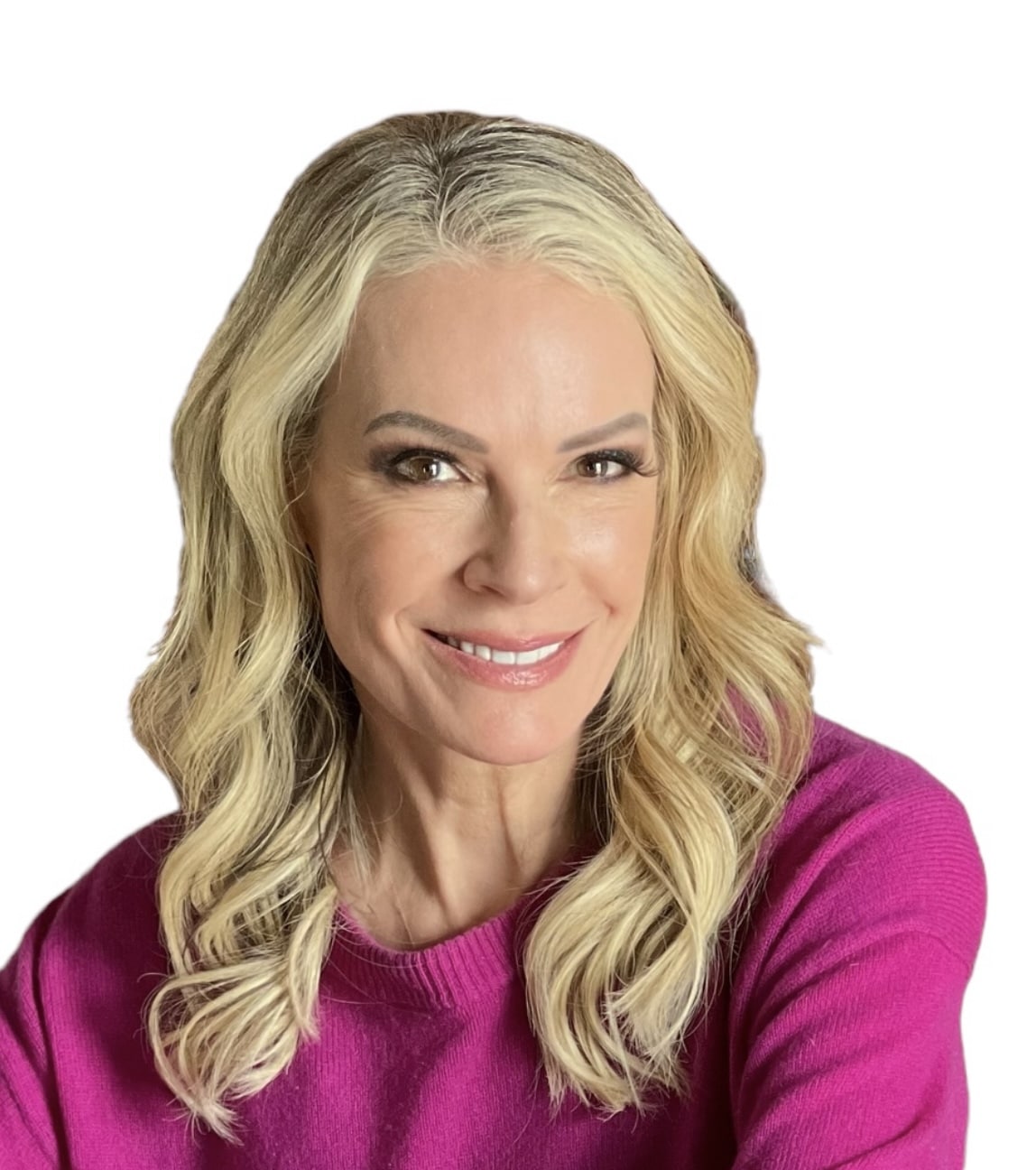
Dr. Nina Savelle-Rocklin is a psychoanalyst, author and radio host specializing in binge eating disorder. She is the author of The Binge Cure: 7 Steps to Outsmart Emotional Eating and Food for Thought: Perspectives on Eating Disorders, and co-editor of Beyond the Primal Addiction. She hosts The Dr. Nina Show radio program on LA Talk Radio.
More episodes

